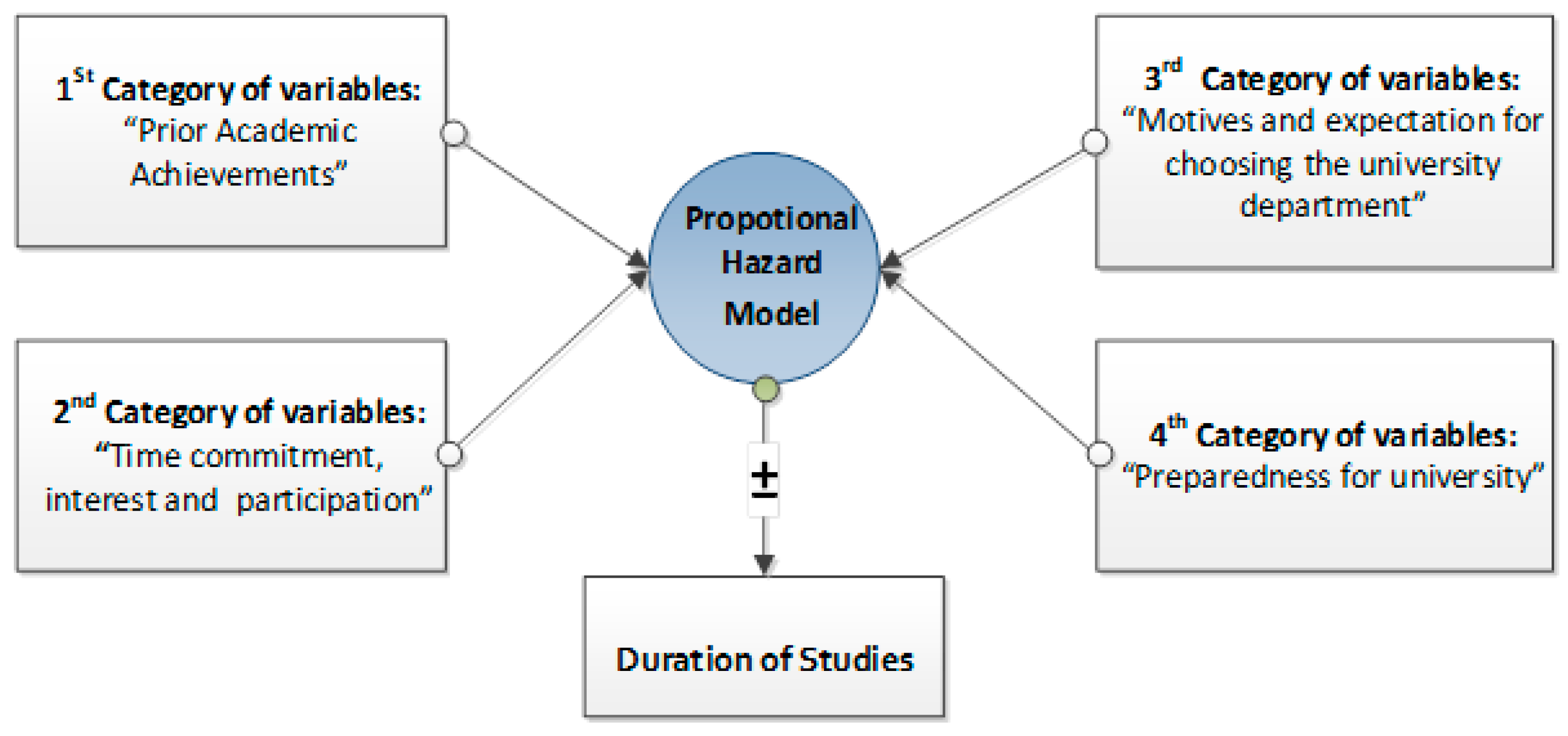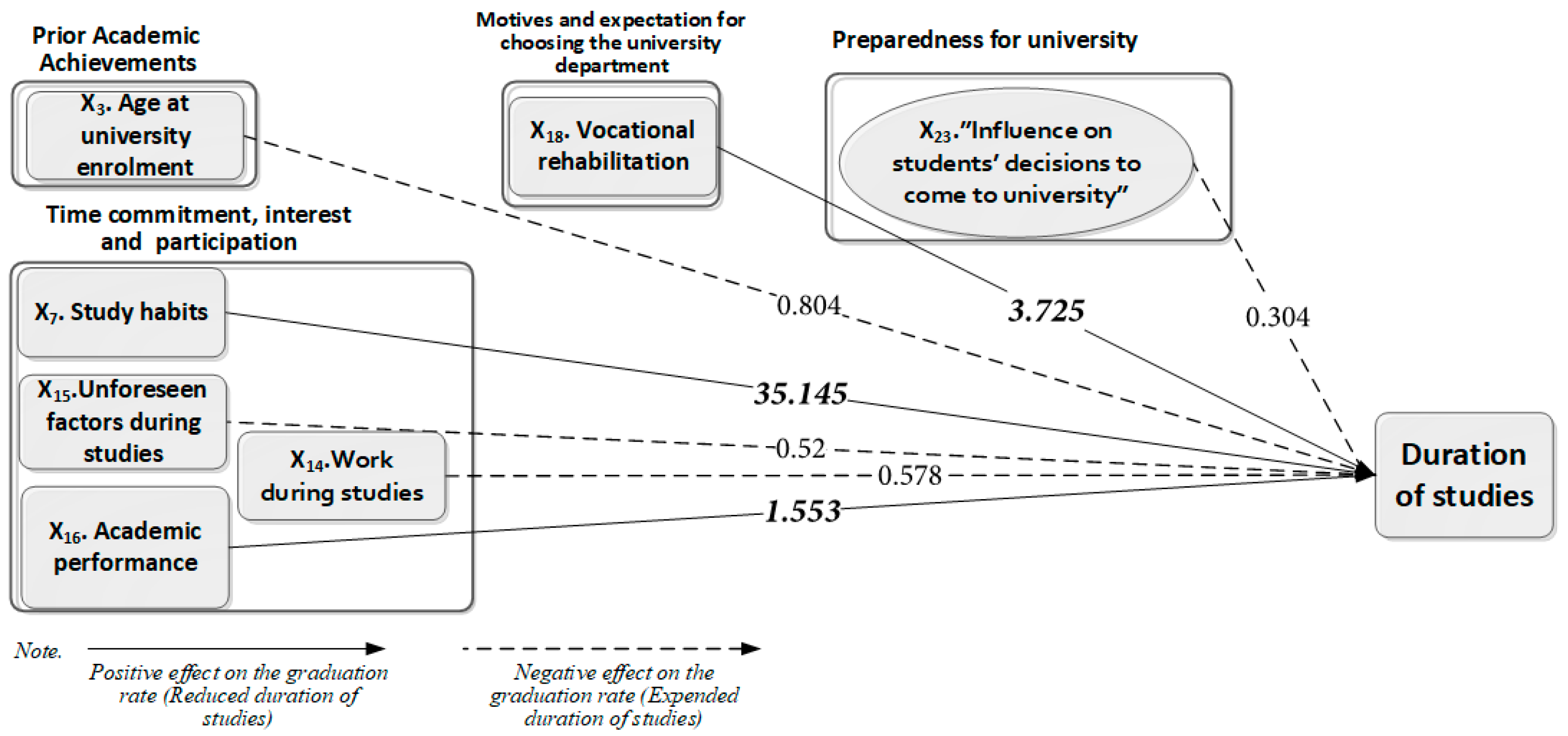Submitted:
27 September 2024
Posted:
30 September 2024
You are already at the latest version
Abstract
Keywords:
1. Introduction
1.1. Psychological Perspective—“Students’ Involvement Theory”
1.2. Sociological Perspective—“Integration Model”
1.3. Organizational/Economic Perspectives—“Attrition Model”
1.4. Integrated Perspective—“Combination of Theories”
2. Materials and Methods
2.1. The Conceptual Model, the Variables and the Data
2.2. The Statistical Model
2.3. The Empirical Model
3. Results
4. Conclusions
References
- J. Mcneely Specialist in Higher Education, Division of Higher Education United States Department Of The Interior Office Of Education J. W. Studebaker, Commissioner United States Government Printing OFFICE.
- V. Tinto. Dropout from Higher Education: A Theoretical Synthesis of Recent Research. Winter, 1975.
- A. F. Schoenfeldt. Personal and Environmental Factors Associated with College Dropouts Among High Aptitude Students. 1966.
- W. G. Spady and / Oise. Dropouts from Higher Education: Toward an Empirical Model’.
- C. Aina. Parental background and College drop out. Evidence from Italy. 2005.
- B. A. Vander Schee. College Student Retention: Formula for Student Success (review). J Coll Stud Dev 2007, 48, 360–362. [Google Scholar] [CrossRef]
- R. D. Reason. Student Variables that Predict Retention: Recent Research and New Developments. 2009.
- A. W. Abtin. Cone Dropouts: A National Profile This Document Has Been Repro-Duced Exactly As Received From The Person Or Organization Orig-Inating It. Points Of View Or Opin-Ions Stated Do Not Necessarily Represent Official Office Of Edu-Cation Position Or Policy.
- J. P. Bean. DROPOUTS AND TURNOVER: The Synthesis and Test of a Causal Model of Student Attrition. 1980.
- J. P. Smith and R. A. Naylor. Dropping out of university: a statistical analysis of the probability of withdrawal for UK university students.
- M. C. Voelkle and N. Sander. University Dropout: A Structural Equation Approach to Discrete-Time Survival Analysis. J Individ Differ 2008, 29, 134–147. [Google Scholar] [CrossRef]
- A. L. Booth, S. E. A. L. Booth, S. E. Satchell, and A. L. Bootht. The Hazards of Doing a PhD: An Analysis of Completion and Withdrawal Rates of British PhD Students in the 1980s. 1995. [Google Scholar]
- G. Kalamatianou and S. McClean. The Perpetual Student: Modeling Duration of Undergraduate Studies Based on Lifetime-Type Educational Data.
- W. Arulampalam, R. Naylor, and J. Smith. Factors affecting the probability of first year medical student dropout in the UK: A logistic analysis for the intake cohorts of 1980-92. Med Educ 2004, 38, 492–503. [Google Scholar] [CrossRef] [PubMed]
- J. P. Smith and R. A. Naylor. Dropping out of university: a statistical analysis of the probability of withdrawal for UK university students.
- S. Herzog. Measuring determinants of student return vs. dropout/stopout vs. transfer: A first-to-second year analysis of new freshmen. Res High Educ 2005, 46, 883–928. [Google Scholar] [CrossRef]
- M. S. Visser, M. Luwel, and H. F. Moed. The attainment of doctoral degrees at Flemish Universities: A survival analysis. High Educ (Dordr) 2007, 54, 741–757. [Google Scholar] [CrossRef]
- A. H. Marshall and M. Zenga. Simulating Coxian phase-type distributions for patient survival. International Transactions in Operational Research 2009, 16, 213–226. [Google Scholar] [CrossRef]
- “E. B. Marc, J. S. “E. B. Marc, J. S. Maurice, and J. S. Richard, Cancer Clinical Trials Methods and Practice (New York, Oxford University Press, 1985).”.
- “92_Snedecor_ΒOOΚ_Statistical Methods”.
- J. R. Chimka, T. Reed-Rhoads, and K. Barker. Proportional hazards models of graduation. J Coll Stud Ret 2007, 9, 221–232. [Google Scholar] [CrossRef]
- D. R. Cox. Biometrika Trust Partial likelihood. 1975.
- “Cox Proportional-Hazards Regression for Survival Data.
- R. N. Fox. Application of a Conceptual Model of College Withdrawal to Disadvantaged Students. 1986.


Disclaimer/Publisher’s Note: The statements, opinions and data contained in all publications are solely those of the individual author(s) and contributor(s) and not of MDPI and/or the editor(s). MDPI and/or the editor(s) disclaim responsibility for any injury to people or property resulting from any ideas, methods, instructions or products referred to in the content. |
© 2024 by the authors. Licensee MDPI, Basel, Switzerland. This article is an open access article distributed under the terms and conditions of the Creative Commons Attribution (CC BY) license (http://creativecommons.org/licenses/by/4.0/).




